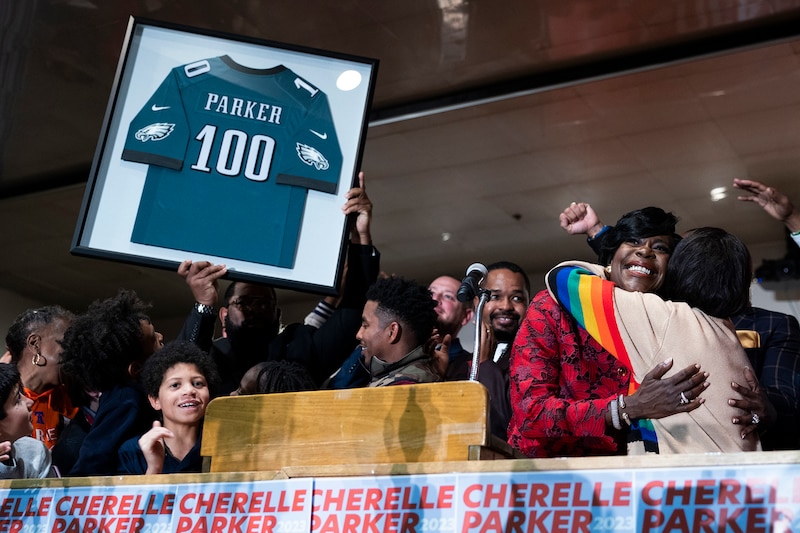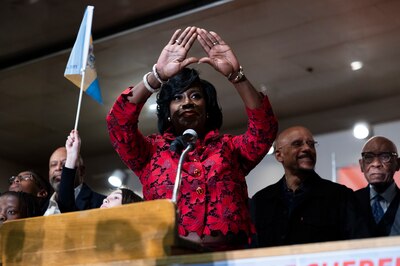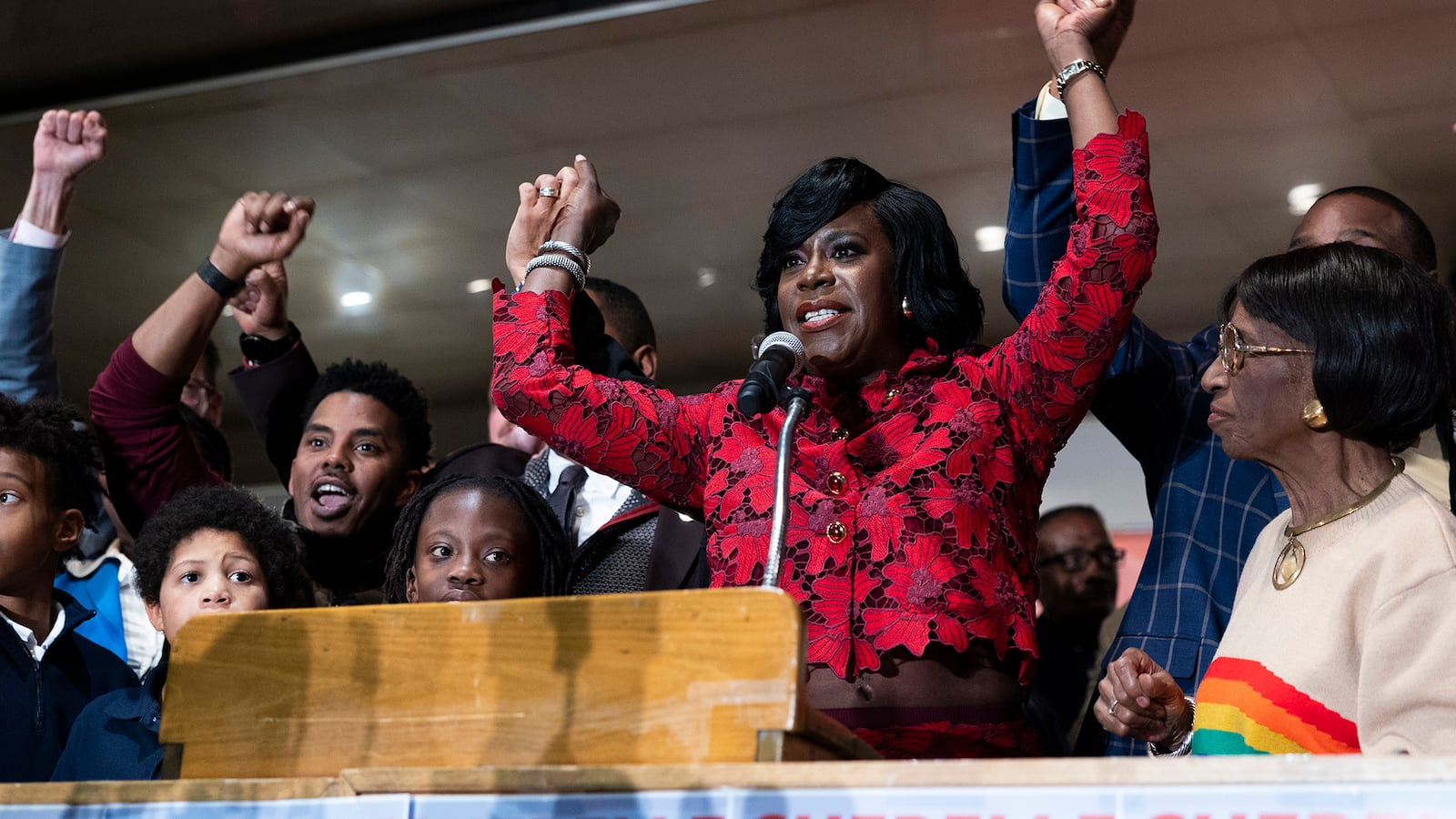There was never much doubt that Cherelle Parker would become the city’s 100th mayor and the first woman ever to lead the nation’s sixth largest city. On Tuesday night, she defeated Republican David Oh, winning more than 73% of the vote.
Like mayors before her, she will lead a city with an underfunded school district beset by concentrated poverty — conditions that limit schools’ ability to make major inroads on the traditional measures of student achievement such as proficiency on state tests and graduation rates.
But unlike previous mayors, Parker — who started her career as a teacher — will take office when a major contributor to those conditions is on the verge of significant change.
That’s because the state is working to comply with a Commonwealth Court judge’s order from February to revamp a state school funding system that has resulted in wide gaps in spending between high- and low-income districts, and has historically shortchanged Philadelphia.
Although the city’s public school district was not a plaintiff in the case that led to the judge’s order, Philadelphia schools could benefit greatly from any changes to the state funding formula, and increases in overall education funding, that Pennsylvania lawmakers ultimately adopt.
What will also help define Parker’s tenure as mayor is how she will use her power to appoint all nine members of the Philadelphia Board of Education — she can rebuild it from scratch, if she wants — and what will happen regarding the one far-reaching education proposal she shared during the mayoral campaign: a year-round schedule for schools.
Parker pushes for more Philadelphia school funding
Parker grew up on Philadelphia’s West Oak Lane, the daughter of a teenage mother. She was raised by her grandparents and attended Philadelphia public schools, graduating from Girls High.
When she voted Tuesday morning, she brought along her high school English teacher, Jeanette Jimenez, who encouraged her to write about her life after her grandmother died.
“I wouldn’t be here without you,” she said.
She was the first in her family to go to college. After attending Lincoln University, she briefly taught English and English as a second language in Pleasantville, New Jersey, before interning for former City Council member Marion Tasco and setting off on a political career.
She will work as mayor to launch all young people on a path of self-sufficiency, she said at her victory speech at the Sheet Metal Workers Local 19 headquarters Tuesday night.
As a member of the City Council and as a state legislator, Parker leveraged methods to collect more revenue for schools, including an initiative that went after delinquent property taxpayers in Philadelphia.

The mayor of Philadelphia has no direct authority over the School District of Philadelphia. But with the power to appoint all nine members of the Board of Education (subject to City Council approval), Parker can help shape education policy on key issues. These include spending priorities, charter schools, how to deal with the district’s aging buildings, and negotiations with unions for the district’s educators and other staff.
Through the school board, she can also influence where (and whether) to close schools and where to build new ones, and how to enhance student safety with respect to everything from environmental hazards such as loose asbestos to gun violence that has plagued the city.
During the campaign, Parker did not tip her hand on any intentions to keep or replace the current board members, saying she would not discuss any personnel issues before the election.
Parker favors keeping schools open longer
Parker’s signature education proposal in the mayoral race was to institute year-round schooling. She said what she had in mind would not involve more days of traditional classroom seat time for students, but more breaks spread throughout the year and a shorter summer vacation, coupled with increased access for students to enrichment activities.
Parker also advocated for a school day that starts earlier and ends later.
In making both these proposals, she cited the hardship that school schedules pose for many parents, rather than touting the additional time as an educational improvement strategy.
“Not all of the young people in the school district of Philadelphia are in the Hamptons in the summer, or at the Vineyard.” she said in her victory speech. “Maybe you thought they were there. But they are not.”
She added that “for those who are being raised, particularly in circumstances like mine, particularly when they’re being raised by someone other than their biological parents, they can benefit from creative year round scheduling. They could benefit from going to school in the morning and having it open until 6:30 in the evening.”
She said after the traditional school day is over, students could learn coding, financial literacy, and other subjects. “I’m getting ready to tell you the big one for me is homework help and tutoring,” said the mayor-elect, who is the mother of a young son. “Have you seen the math today?”
As far as paying for any such change, she has said she favors devoting a higher proportion of the city’s property tax revenue to the district — 58% instead of 55%. Parker said that change would bring $50 million in additional revenue for schools even before any statewide funding reform.
Parker is a strong union supporter, and many of the city’s labor leaders endorsed her in the Democratic primary, although the Philadelphia Federation of Teachers supported rival Helen Gym. PFT president Jerry Jordan did not attend Parker’s victory party Tuesday night, unlike many other union heads, but issued a statement saying members “celebrate and honor this momentous and historic occasion… (Parker’s election) shows little girls, especially Black girls, what they can achieve.”
On social media, American Federation of Teachers President Randi Weingarten also congratulated Parker for making history as the first woman to lead the nation’s sixth largest city.
Parker will for sure need union buy-in for her plan to move to a year-round school schedule and keep school buildings open longer.

Parker skirts divisions over charter schools
One area where Parker as a candidate took a measured approach was charter schools.
Nearly one-third of Philadelphia’s public school students attend charters, making the city home to one of the largest charter sectors in the country. The school board must approve charter school applications, and has essentially imposed a moratorium on new charters since 2018.
During the campaign, Parker did not directly answer a question from Chalkbeat about whether she would like Philadelphia to have more charter schools.
“I want quality seats, and I don’t care where they are,” she said, adding: “I will not allow anyone to act as if district-run and charter schools are warring factions.” She forcefully repeated that in her victory speech Tuesday.
“If anybody is interested in talking to me about public education, and you’re trying to pitch traditional publics against charters, don’t do it,” she said.
Parker has also avoided wading into a controversy over whether the Board of Education has discriminated against Black-led charter schools.
A report issued by a law firm last month found problems with the charter monitoring system that has resulted in a larger proportion of Black-led charters being closed. But the report, two years in the making, found no “intentional” racial discrimination.
Parker did say that as mayor she would “insist” that the state legislature reinstate a budget provision that sent millions of dollars to school districts to compensate them for “stranded costs” linked to charters and cyber charter schools that occur when students leave district schools in patterns that don’t allow for neat downsizing.
That provision was eliminated in 2011 by state lawmakers under the administration of former Gov. Tom Corbett, a Republican; half the total amount came to Philadelphia. Losing that reimbursement was among the factors that fueled resistance in Philadelphia to expanding the charter sector, including near the end of the period when the district was under state control from 2001 to 2017.
Parker’s main goal now, which she said is attainable through government and private collaboration: “We want all of our children in a 21st century, modern school building with the highest academic achievement.”
Dale Mezzacappa is a senior writer for Chalkbeat Philadelphia, where she covers K-12 schools and early childhood education in Philadelphia. Contact Dale at dmezzacappa@chalkbeat.org.

